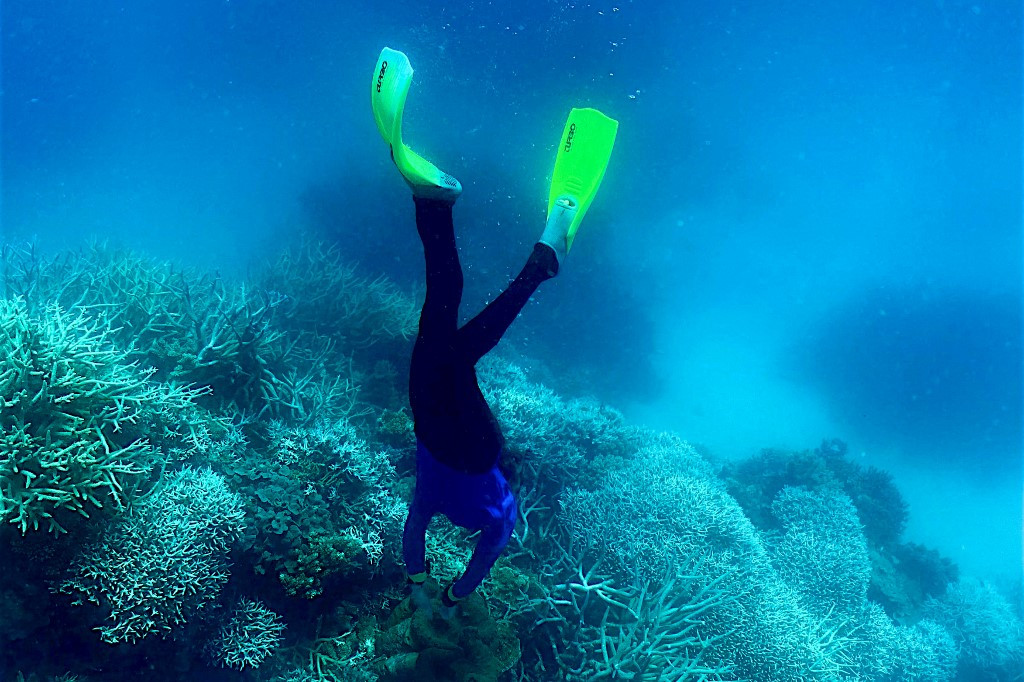Popular Reads
Top Results
Can't find what you're looking for?
View all search resultsPopular Reads
Top Results
Can't find what you're looking for?
View all search resultsThere is no livable planet without the ocean
The private sector can play a massive role in driving and catalyzing the changes that are needed to rebuild and regenerate an ailing ocean.
Change text size
Gift Premium Articles
to Anyone

The ocean is vast, and its beauty and bounty move the soul. The potential of the ocean to be a powerhouse of sustainable business and equitable, resilient and inclusive prosperity for communities around the world is equally impressive.
There is growing recognition of the ocean’s centrality to achieving the global sustainable development agenda in its broadest sense – from food and job security to tackling the climate crisis; from improving equality and access to clean energies to boosting health and well-being. Ocean action is increasingly seen as a priority by the communities and leaders we work with: spanning across initiatives to end overfishing, decarbonize shipping, strengthen blue carbon projects, mainstream sustainable coastal tourism, fast-track renewable energy, improve the value chains of food from the ocean and more.
There can be no healthy planet without an ocean that is resilient, abundant and thriving. To achieve this, measures to proactively safeguard the ocean also need to be ramped up. There are growing calls – and widening strides – to protect at least30% of the ocean by 2030. This approach, known as “30 by 30” or 30x30, is a win-win for planet and people (a well-protected ocean being much better able to provide food and jobs, and buffer us against the worst effects of the climate crisis).
Parties to the UN Convention on Biological Diversity meeting (COP15) in December 2022 in Montreal agreed on a landmark deal to do this, and we strongly urge countries, companies and communities to take bold and concrete steps to translate ambition and commitment to tangible and meaningful action and impact immediately.
The benefits of a healthy ocean are threatened by the mounting pressures and unsustainable practices it is facing across sectors and geographies. While data, science, community knowledge and ambitious public policies provide the foundations and frameworks for speed, scale and lasting impact, the private sector can play a massive role in driving and catalyzing the changes that are needed to rebuild and regenerate an ailing ocean.
It is estimated that were the ocean a country, it would be the seventh largest in the world by GDP equivalence for what it contributes to the global economy. In addition, the World Economic Forum’s New Nature Economy Report II: The Future of Nature and Business estimated in 2020 that maintaining a healthy and productive ocean can create upwards of US$170 billion in business opportunities every year, and 14 million extra jobs by 2030.
In November 2022 in Bali, on the occasion of the Group of 20 Leaders’ Summit, the government of Indonesia, working with the World Economic Forum, launched the Ocean 20 – a new agenda for sustainable growth through the development of a blue economy across the G20. It is deeply inspiring and encouraging to witness the conviction and commitment of leaders who participated in the launch from across both public and private sectors.
The baton has been passed to the government of India, holder of the current G20 presidency, to take this agenda forward. The World Economic Forum is also convening the Ocean 100 Dialogues – a collaborative science-business platform that enables the largest businesses across the ocean economy to deliver transformative and trail-blazing cross-industry action to accelerate sustainable ocean stewardship.
Initiatives such as Ocean 20 engender real and tangible hope – underpinned by resolve and conviction, that progress is being made for ocean health, with all stakeholders on board. The ocean is not just integral to a healthy planet – it can be a positive impact multiplier in countless ways.
From corporations across the ocean economy and around the world, we need to see business leaders adopt the regeneration of ocean health as a strategic priority – and integrate it as part of a robust climate action strategy. This might touch on concrete commitments such as pledging to reach net zero, choosing cleaner and greener business practices, preventing pollution and actively engaging as stewards of the ocean in their respective fields.
It is tremendously encouraging, meanwhile, to see the acceleration and scaling of ocean innovation to address the range of challenges. We would love to see more of it – from data for improved governance and technology to restore ocean health, to solutions that will better protect the coastal ecosystems that are the life support system for millions of people in coastal communities.
For this fertile innovation development to thrive, there needs to be an ecosystem to foster the wealth of ocean solutions already out there and encourage the emergence of many more – and to ensure their sustainable scale-up. The 1000 Ocean Startups, a coalition now hosted by the World Economic Forum has made excellent strides to accelerate ocean impact innovation.
In parallel to this, there is an investment and financing opportunity that must be bridged to sustainably develop the blue economy. Both public and private sector investments are sorely needed for the development of robust governance frameworks, science-based and community-sourced knowledge, and creative solutions, whether it is in the areas of blue food, blue carbon, offshore wind, sustainable coastal tourism or others.
We need to pursue pathways that combine planet, people and prosperity, and finance the $174.5 billion needed per year to achieve the Sustainable Development Goal for the ocean, SDG14, by 2030.
It is time to put ocean sustainability on the priority agenda of global business leaders. Only with a healthy ocean can we create intergenerational wealth for people and planet.
***
Gim Huay Neo is managing director, Centre for Nature and Climate, World Economic Forum (WEF), where Kristian Teleki is portfolio head. This article is part of the WEF’s Annual Meeting 2023.











